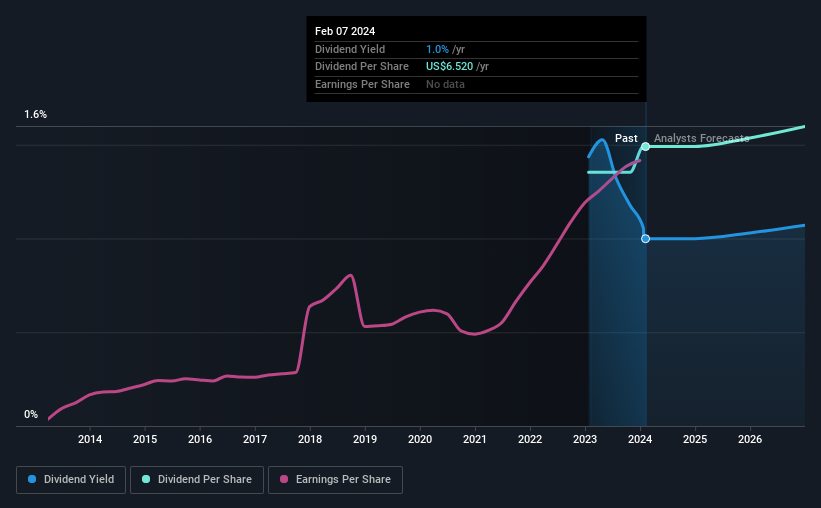- United States
- /
- Trade Distributors
- /
- NYSE:URI
Be Sure To Check Out United Rentals, Inc. (NYSE:URI) Before It Goes Ex-Dividend

It looks like United Rentals, Inc. (NYSE:URI) is about to go ex-dividend in the next 4 days. The ex-dividend date is one business day before the record date, which is the cut-off date for shareholders to be present on the company's books to be eligible for a dividend payment. The ex-dividend date is important because any transaction on a stock needs to have been settled before the record date in order to be eligible for a dividend. This means that investors who purchase United Rentals' shares on or after the 13th of February will not receive the dividend, which will be paid on the 28th of February.
The company's next dividend payment will be US$1.63 per share, on the back of last year when the company paid a total of US$6.52 to shareholders. Calculating the last year's worth of payments shows that United Rentals has a trailing yield of 1.0% on the current share price of US$652.73. Dividends are a major contributor to investment returns for long term holders, but only if the dividend continues to be paid. So we need to investigate whether United Rentals can afford its dividend, and if the dividend could grow.
See our latest analysis for United Rentals
Dividends are usually paid out of company profits, so if a company pays out more than it earned then its dividend is usually at greater risk of being cut. United Rentals has a low and conservative payout ratio of just 17% of its income after tax. A useful secondary check can be to evaluate whether United Rentals generated enough free cash flow to afford its dividend. What's good is that dividends were well covered by free cash flow, with the company paying out 18% of its cash flow last year.
It's positive to see that United Rentals's dividend is covered by both profits and cash flow, since this is generally a sign that the dividend is sustainable, and a lower payout ratio usually suggests a greater margin of safety before the dividend gets cut.
Click here to see the company's payout ratio, plus analyst estimates of its future dividends.

Have Earnings And Dividends Been Growing?
Stocks in companies that generate sustainable earnings growth often make the best dividend prospects, as it is easier to lift the dividend when earnings are rising. If earnings fall far enough, the company could be forced to cut its dividend. It's encouraging to see United Rentals has grown its earnings rapidly, up 22% a year for the past five years. United Rentals looks like a real growth company, with earnings per share growing at a cracking pace and the company reinvesting most of its profits in the business.
Unfortunately United Rentals has only been paying a dividend for a year or so, so there's not much of a history to draw insight from.
To Sum It Up
From a dividend perspective, should investors buy or avoid United Rentals? United Rentals has been growing earnings at a rapid rate, and has a conservatively low payout ratio, implying that it is reinvesting heavily in its business; a sterling combination. It's a promising combination that should mark this company worthy of closer attention.
On that note, you'll want to research what risks United Rentals is facing. Our analysis shows 1 warning sign for United Rentals and you should be aware of this before buying any shares.
A common investing mistake is buying the first interesting stock you see. Here you can find a full list of high-yield dividend stocks.
New: AI Stock Screener & Alerts
Our new AI Stock Screener scans the market every day to uncover opportunities.
• Dividend Powerhouses (3%+ Yield)
• Undervalued Small Caps with Insider Buying
• High growth Tech and AI Companies
Or build your own from over 50 metrics.
Have feedback on this article? Concerned about the content? Get in touch with us directly. Alternatively, email editorial-team (at) simplywallst.com.
This article by Simply Wall St is general in nature. We provide commentary based on historical data and analyst forecasts only using an unbiased methodology and our articles are not intended to be financial advice. It does not constitute a recommendation to buy or sell any stock, and does not take account of your objectives, or your financial situation. We aim to bring you long-term focused analysis driven by fundamental data. Note that our analysis may not factor in the latest price-sensitive company announcements or qualitative material. Simply Wall St has no position in any stocks mentioned.
About NYSE:URI
United Rentals
Through its subsidiaries, operates as an equipment rental company.
Good value with acceptable track record.
Similar Companies
Market Insights
Community Narratives




